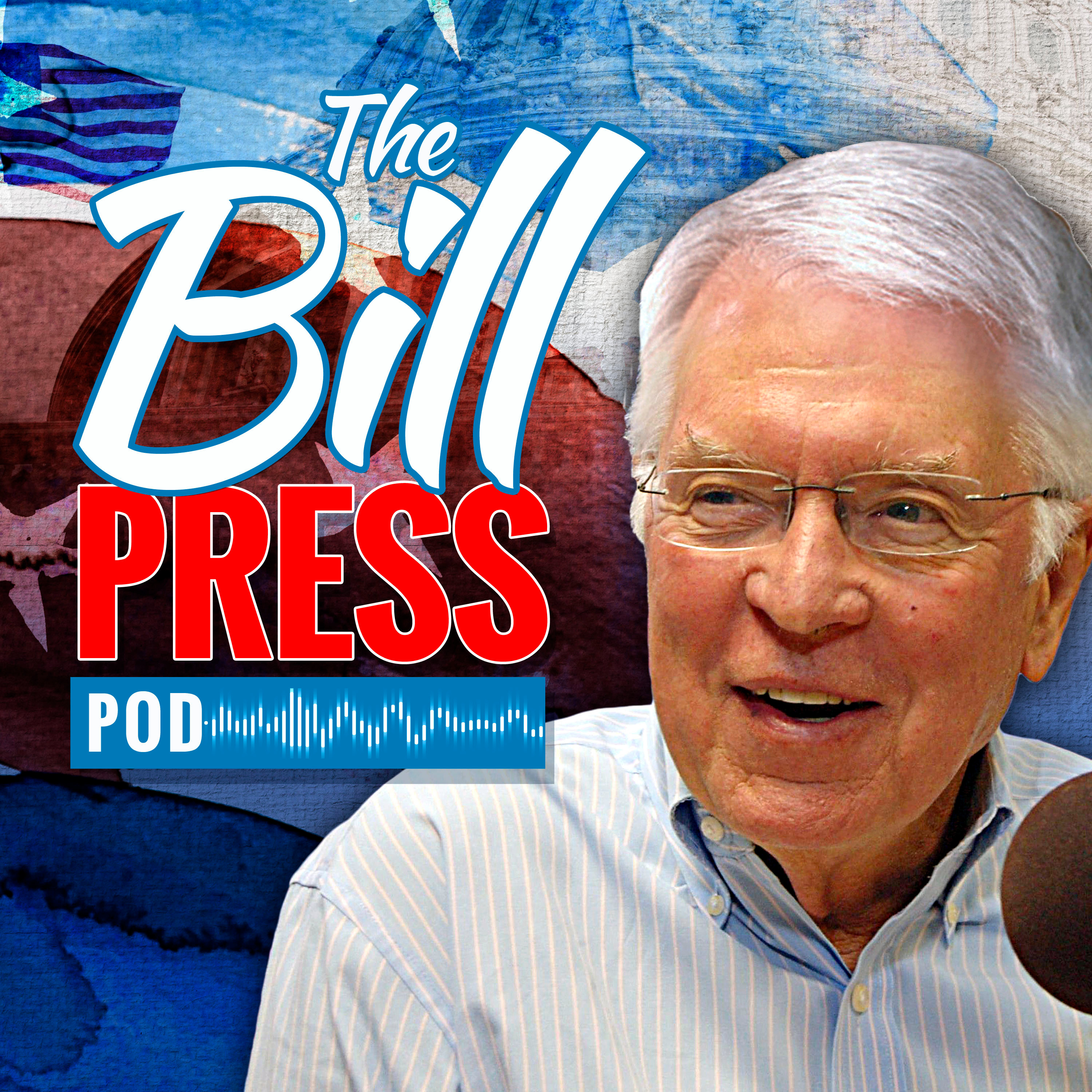
The Darrell McClain show
Independent media that won't reinforce tribalism. We have one Planet; nobody's leaving, so let’s reason together!! Darrell McClain is a Military veteran with an abnormal interest in politics, economics, religion, philosophy, science, and literature. He's the author of Faith and the Ballot: A Christian's Guide to Voting, Unity, and Witness in Divided Times. Darrell is a certified Counselor. He focuses primarily on relationships, grief, addiction, and PTSD. He was born and raised in Jacksonville, FL, and went to Edward H white High School, where he wrestled under Coach Jermy Smith and The Late Brian Gilbert. He was a team wrestling captain, District champion, and an NHSCA All-American in freestyle Wrestling. He received a wrestling scholarship from Waldorf University in Forest City, Iowa. After a short period, he decided he no longer wanted to cut weight, effectively ending his college wrestling journey. Darrell McClain is an Ordained Pastor under the Universal Life Church and remains in good standing, as well as a Minister with American Marriage Ministries. He's a Believer in The Doctrines of Grace, Also Known as Calvinism. He joined the United States Navy in 2008 and was A Master at Arms (military police officer). He was awarded several medals while on active duty, including an Expeditionary Combat Medal, a Global War on Terror Medal, a National Defense Medal, a Korean Defense Medal, and multiple Navy Achievement Medals. While in the Navy, he also served as the assistant wrestling coach at Robert E. Lee High School. He's a Black Belt in Brazilian Jiu-Jitsu under 6th-degree black belt Gustavo Machado. Darrell Trains At Gustavo Machado Norfolk under the 4th-degree black belt and Former Marine Professor Mark Sausser. He studied psychology at American Military University and criminal justice at ECPI University.
The Darrell McClain show
Courtroom Confrontations and Legislative Showdowns in US Politics
Courtrooms can be cauldrons of high drama, and in this segment, I navigate the tumultuous waters of a high-profile trial, contrasting the composure of Michael Cohen with the courtroom theatrics of Robert Costello. The reliability of court transcripts emerges as a silent player in the pursuit of justice, and you won't want to miss my breakdown of these critical moments that could sway the scales in unexpected directions.
Turning to the esteemed halls of Congress, we witness the transformation of legislative sessions into battlegrounds of disruption and provocation, where figures like Marjorie Taylor Greene and Alexandria Ocasio-Cortez spar over the rules of discourse. The chapter cuts through the chaos to ponder the implications of these social media-style politics on the future of our democratic processes. This episode isn't just about bearing witness to the spectacle; it's about understanding the ripples these disruptions cause in the fabric of our society. Join me for an unflinching look at the stark reality of politics today.
Welcome to the Darrell McClain Show. I'm your host, darrell McClain. Of course, today is 5-23 of 2024. You have the privilege of joining me for episode 407. We have a big news show today, so let's get into our episode.
Speaker 1:So what we all were somewhat didn't know if we were going to have, but I don't know if we wanted it, and this was because of the way the two candidates behaved in the primary season. But it has now been set. The stage has been set. There is going to be two presidential debates so far. So President Biden's campaign proposed two debates with the former President Trump. On Wednesday they actually booked a commission of presidential debates and potentially setting the stage for a face-off as soon as next month. The Biden campaign called for the first debate to take place in late June, after the president returns from a group of seven summit in Europe, and Trump's hush money trial in New York will have likely been concluded by then, something we will be covering in a bit Now. That campaign suggested a second debate in September, ahead of the start of only voting in many states, as well as a vice presidential debate in late July after the Republican National Convention.
Speaker 1:Now, as Donald Trump has said, he will debate Joe Biden anytime and anywhere. We hope both campaigns can quickly accept broadcast media debates. Invitation on the parameters above. Now. This came from the Biden campaign chair, jen O'Malley Dillon, and this was written in a letter to the commission on Wednesday. Americans need a debate on the issues, not a tedious debate about debates. The Biden campaign said it broke directly with news organizations to set up debates, spurring the Commission on Presidential Debates, which has facilitated the debates between presidential candidates since 1988. 1988. O'malley Dillon, in her letter, suggested coordinating with the outlets that hosted the primary debates in 2016 and the Democratic primary debates in 2020 to avoid any note of bias.
Speaker 1:Trump, who has repeatedly questioned Biden's mental acuity and the ability to do the job, said Wednesday he would accept the terms proposed by the Biden campaign. Trump went on to say I am ready and willing to debate Cricket Joe at the two proposed times in June and September. Trump posted this on Truth Social. I would strongly recommend more than two debates and, for excitement purposes, a very long venue. Although Biden is supposedly afraid of crowds, that's only because he doesn't get them. Just tell me when I'll be there. Let's get ready to rumble.
Speaker 1:Negotiations directly between the two campaigns could also keep independent and third-party candidates, most notably Robert F Kennedy Jr, from joining the debate stage. Now there has been uncertainty about whether Biden and Trump could come to an agreement about debates ahead of November. Trump had previously railed against the commission and he skipped each GOP primary debate, citing his lead in the polls. With a steady lead in the battleground state polling, trump has tried to turn the pressure up on Biden, vying to debate the incumbent anytime, anywhere, anyplace, place. Now Biden, meanwhile, months not firmly committed to debating Trump, only recently telling radio host Howard Stern that he would be happy to do so.
Speaker 1:On Wednesday, biden posted a video to social media more directly taking the fight to Trump. Donald Trump lost two debates to me in 2020 and since then he hasn't shown up for a debate, biden said in the video. Now he's acting like he wants to debate me again. Well, make my day, pal. I'll even do it twice. So let's pick dates, donald, I hear you're free on Wednesdays. He added in reference to Trump's weekly off day from his court hearings in his hush money trial. The Commission on Presidential Debate had announced dates for three presidential debates beginning mid-september. Trump campaign had pleaded with the commission to add more debates and host them earlier arguing. Millions of americans could have cast their ballots early, before the second debate was scheduled to occur, so as like everything that we do on here.
Speaker 1:We're going to add a bit of nuance here. So normally, when it comes to these debates, what normally happens is the incumbent president, who is now Joe Biden, normally gets just slaughtered in the debates. It is usually because the person running for president has run through a primary process where they are debating the entire time. They debate through the entire primary process, maybe 16 people, then it gets down to 10. Then it gets down to 5. Then 2. And then you know, they pick their fighter and they go fight and then they go and battle the incumbent president and the incumbent president and the incumbent president has not had a debate in four years, so he normally always loses the first debate.
Speaker 1:This is a very different, because Donald Trump avoided the entire primary process. So he did not debate Nikki Haley. He did not debate Chris Christie. He did not debate Nikki Haley. He did not debate Chris Christie. He did not debate Vivek Ramaswamy. He did not debate Ron DeSantis.
Speaker 1:Donald Trump avoided all of the debates that would have prepared him to be ready for a lack of a better term to debate Joe Biden. So, as law, you know, donald trump likes to think. You know, by his very nature of his presence that he is going to be able to just beat joe biden and do all this and all that, but neither one of these men have actually had to have a debate since the last time that they debated each other, and so donald trump is probably going to walk into this debate to just debate a little more rusty than he thinks he is, and because the media liberal media and conservative media has focused so heavily on the supposed cognitive problems with the current president, joe Biden just has to prove that he has a pulse and not die on stage and show a little bit of flair and he will be seen as the winner of the debate. He'll be seen as not coming off as embarrassing. Added to this debate is this other extra added model that they have added to this thing I think I used the word added a few times, but it's going to be very different which is they're going to have the ability that when somebody's time is expired, they're going to cut off their microphones, and that's something very different. If you remember the last, uh, a few debates, it just I don't really know if it served the public, it seemed.
Speaker 1:What happens in these debates is people talk loudly and scream over each other, and then the premise of this whole assertion is if I keep talking, even if I talk over you, this means that I have won. This proves that I'm tough, and I don't know if that serves the public. So in this model, it's going to be different. When your time is up, your microphone will be cut and then it'll go right to the other person speaking, and I think this model may serve the person who's more polished better, because it will. You won't have to do that. Let me show how strong I am thing, because the person is not going to have the ability to interrupt you the entire time. So here's one of the stupid things that I really avoided talking about, but I'm going to have to because it isn't, even though I don't want it to be.
Speaker 1:It's a big deal, and that is the Trump hush money trial, and that is the fact that the former president Trump's defense team has rested his case without the president testifying, and the trial hit a new level of chaos yesterday so much that the judge had to clear the room and scold the witness Clear the courtroom, exclamation point.
Speaker 5:Now, you can spend your life working in courtrooms and never hear those words clear the courtroom. And if you have spent time in Judge Juan Merchan's courtroom, it would feel all the more impossible that you are hearing the words clear the courtroom and that you were hearing those words said repeatedly and loudly and, most shockingly of all, angrily by Judge Juan Merchan, as we did today at 4.01 pm and as I was walking out of the courtroom, I asked a retired New York City judge who was in the audience today how many times he had to clear the courtroom when he was a judge. His answer was what I expected Never In a multi-week trial. A courtroom becomes a community. Everyone gets to know each other visually at least. We members of the news media make new friends at other news organizations During the breaks when we can talk. The jury becomes very familiar with all of the lawyers and they know which of us in the audience section are the regulars and who are the tourists popping in for a day. And the leader of every courtroom community is the judge. He or she sits literally above us all, at a higher altitude, as a symbol of the authority that the judge actually does have A good trial judge who keeps things moving efficiently, does not waste time and is very solicitous of the jury's needs and does everything he or very solicitous of the jury's needs and does everything he or she can to accommodate the jury and treats the jury as the most important people in the room, usually has the respect and the gratitude of that jury and later, after the trial, when some jurors will be asked by their friends about the judge, their shorthand, quick answer often is I love him or I love her, love the judge. That's very common with juries. The jury in Judge Juan Marchand's courtroom has every reason to feel every positive thing that any juror has ever felt about their trial judge, their boss, and so I know from experience, as well as I know anything about courtroom life, that the jury didn't like it one bit today when the only testifying witness that the Trump defense is going to call decided to openly disrespect the judge that the jury respects so fully.
Speaker 5:Robert Costello was the second witness called by the defense and its last witness. There aren't going to be any more witnesses. The first witness the defense called was a paralegal who works for the Trump defense team, who was simply there to introduce a spreadsheet that he created of a list of phone calls. That witness did not provide any testimonial evidence in the case. That witness will never be quoted by anyone not a real evidentiary witness and so the entire Trump defense comes down to the testimony of attorney Robert Costello Robert Costello, who used to work as a federal prosecutor for Rudolph Giuliani. As his boss.
Speaker 5:Robert Costello was one of the lawyers Michael Cohen considered retaining for his criminal defense. After the FBI executed search warrants at Michael Cohen's home, at his hotel room where he was temporarily staying and in his office, which was located exactly 20 floors above where I'm sitting right now in this vast office building in Rockefeller Center, michael Cohen decided not to hire Robert Costello, and today anyone could see why. For once, the worst criminal defense lawyer in the room was not one employed by Donald Trump. I have not seen a worse criminal defense lawyer than Robert Costello, or a stupider one Costello or a stupider one Based on just what we saw him do on the witness stand today in court.
Speaker 5:Trump criminal defense lawyer Emil Boeve did the questioning. Assistant District Attorney Susan Hoffinger did the objecting to Attorney Boeve's questions. Almost all of the District Attorney's objections were sustained instantly by Judge Mershon, who makes very quick decisions about objections, but because Robert Costello answered questions even quicker than that, his answers frequently were entered in the record just as the objection was being raised. Question Is that term back channel? Is that a term that Mr Giuliani used? Answer yes, ms Ovinger. Objection Judge Marchand sustain. Ms Ovinger, move to strike your Honor Judge Marchand stricken. Stricken means that Robert Costello's one-word answer yes cannot be used as evidence by the jury. The lawyers can't quote that later. Robert Costello didn't like the objections. It's not unusual for lawyers as witnesses to have their own opinion about the objections, but it is very unusual for them to in any way voice that opinion about the objections from the witness stand.
Speaker 5:Attorney Michael Cohen surely had some feelings about the objections when he was on the witness stand. But attorney Michael Cohen behaved in a fully professional way for a lawyer testifying under oath in court. That's not a comment on Michael Cohen's credibility, simply his manner as a witness, which was fully respectful of the process, fully respectful of the judge at all times and fully respectful of Donald Trump's criminal defense lawyer cross-examining him, to whom Michael Cohen's most frequent answer was yes, sir, yes, sir, repeatedly, always called him sir. And here is when we all saw and heard something we've never seen in a courtroom before. Little did we know there was much more to come after this Question. I would like him to take a look at the second paragraph of that email. Do you see where it says the question of timing is premature Answer? Yeah, yeah, I see that question. What did you mean by that, ms Hobbinger?
Speaker 5:Objection Judge Marchand sustained Robert Costello. Jeez, I was in the back of the courtroom, I was in the last row and I could hear Robert Costello, who's sitting right beside the jury, say jeez, all the way back there about the objection. That was his attitude toward the objection, about the objection. That was his attitude toward the objection. And, more importantly, that was his attitude about Judge Marchand sustaining the objection. Jeez, that was Robert Costello's objection to the judge sustaining the objection. Judge Marchand was shocked, I was shocked, I was shocked. We have never seen Judge Mershon shocked before. And Lebovi was no doubt shocked and tried to race past the moment with another question which got another objection and was sustained, and was sustained. But Judge Marchand leaned across the bench and raised his voice, looking directly at the witness right there, and said I'm sorry, meaning what did you just say? And after a silence, judge Marchand, in an agitated but not yet angry way, once again said I'm sorry, and again meaning what did you just say? Of course he knew what he said. He said geez, and that drew attention to what Robert Costello said. The judge drew that attention in a big way. That line that I just told you from Judge Merchan saying I'm sorry, I'm sorry that line does not appear in the court transcript because too much was happening in the courtroom for the court reporter who had never seen anything like this.
Speaker 5:And this is something that people who deal with court transcripts for many years know, especially transcripts produced at very high speed, like the daily transcripts in this trial. They frequently have small and always unimportant errors, words left out, words that are simply incorrect. For example, in that same transcript earlier, when Robert Costello is introduced in the transcript as a witness, the transcript incorrectly says Robert J Costello, a witness called on behalf of the people. Now, that is wrong. Everyone knows that's wrong. Robert Costello was called on behalf of the defense and the lawyers on both sides of the case will be able to use and work with this transcript without suffering any harms from those small typos that they will all recognize and other occasional words left out. But that's just something you have to know about these transfers. This transcript is amazing. I have never seen a treasurer make a mistake on any crucial evidentiary word from testimony. But the relevant factoid about this is simply that these transcripts can sometimes be slightly wrong.
Speaker 5:After Judge Marchand said I'm sorry the second time by which he meant pardon me, what did you just say? And he meant it in a threatening manner Robert Costello said strike it. Now you sometimes hear lawyers during cross-examination begin a question and then say strike it and they start over again. And that doesn't mean that the question they started actually gets stricken from the record. It's just almost a note to themselves that the question wasn't going to come out right, so let me start this over again. It's like the lawyer saying never mind, I'm not going to ask that question, I'm going to ask another question. Everyone understands that code when a lawyer says that. So Robert Carstello's lawyer reflex came in to say strike it over something that even he at that point realized he never should have said. That wise guy jeez about the judge publicly in the room in front of the jury, attacking the judge sustaining an objection.
Speaker 5:It was a level of madness by a witness who actually is a criminal defense lawyer that you could only wonder whether he should be immediately subjected to a sobriety test. How else could that happen? That's how out there and crazy and out of control that moment was from a criminal defense lawyer. But it got worse. Judge Marchand, in his typically calm voice, shifted into saying Counsel, let's take a minute. Can the jury please step up?
Speaker 5:The court officers then led the jury out of the room, whereupon Judge Marchand turned to the witness beside him, using a voice sterner than anything we have heard from Judge Marchand. Judge Marchand, mr Costello, I want to. I would like to discuss proper decorum in my courtroom, robert Costello. But I'm sorry, go ahead, judge Marchand. I want to discuss proper decorum in my courtroom, robert Costello. Right, judge Marchand. I want to discuss proper decorum in my courtroom, robert Costello. Right, judge Marchand, okay. So when there is a witness on the stand, if you don't like my ruling, you don't say geez, okay, and then you don't say strike it, because I'm the only one that can strike testimony in the courtroom. Do you understand that, robert Costello? I understand, judge Marchand. Okay, and then if you don't like my ruling, you don't give me side eye and you don't roll your eyes. Do you understand that? Do you understand that, robert Costello? I understand that. I understand what you're saying, judge Merchant. Okay, thank you, let's get the jury back. Are you staring me down right now, robert Costello? No, I'm just wondering how Judge Merchant clear the courtroom. Please Clear the courtroom, robert Costello. No, I'm just wondering how Judge Marchand clear the courtroom. Please clear the courtroom, robert Costello. Do you want me to answer your question? The sergeant sir, please, the court officer, step outside, please, step outside, step to the side, please. And we all began to get up to leave the courtroom.
Speaker 5:Those of us who knew that the judge had full authority to clear that courtroom I mean half of the reporters in the courtroom tried to stay in their seats. Some tried to argue with the judge. One said that there's a press lawyer in the courtroom with them who will insist that they have a right to be in the courtroom and for two pages of court transcript. There are entries that we've never seen before in a court transcript quoting the court officer saying step out. Repeatedly. A person in the audience saying why this is an open courtroom. The court officer saying this is not an open courtroom. We will answer all questions in the hallway. Please step out. This is a Supreme Court courtroom. Step out. Person in the audience. This is an open courtroom. Now you can spend your life reading court transcripts and you will never see the entry person in the audience and have that person be speaking. That does not happen.
Speaker 5:What we have for the minutes it took to clear that courtroom. What we had then was chaos in the courtroom, all caused by the wise guy on the witness stand who decided he was going to show the judge that he was smarter than the judge and worse for him and for the Trump defense. He was going to show the jury that he thinks he's smarter than their judge and it is very unlikely that that jury thinks that there is anyone in that courtroom who is as smart as their judge. After five minutes in the hallway that seemed like forever we were brought back into the courtroom, having no idea what was said in our absence, but knowing it was about the wise guy on the witness stand. This evening at 7.27 pm, the final pages of the complete transcript arrived in our inbox and we got to see what happened when Judge Marchand cleared the courtroom. The transcript says, quote the courtroom is cleared of people in the audience by the court officers at this time.
Speaker 5:The court all right, let the record reflect that it's now five after four. Let the record also reflect that the court officers had great difficulty clearing the courtroom because the courtroom is made up primarily of the press and I can appreciate that the press wants to be present for every part of these proceedings. Therefore, this record is not sealed. The press will have access to this record. The fact that I had to clear the courtroom and that the court officers, including the captain, had great difficulty clearing the courtroom and that there was argument back and forth between the press and including counsel for the press, goes to why I had to clear the courtroom in the first place.
Speaker 5:And that is sir room in the first place. And that is, sir. Your conduct is contemptuous right now. I'm putting you on notice that your conduct is contemptuous. If you try to stare me down one more time, I will remove you from the stand. I will strike his entire testimony. Do you understand me, mr Bovee? Yes, judge, I understand. The court, listen to the question and answer the question. The witness Can I say something please? The court no, no, this is not a conversation. The witness Okay, the court. All right, let's we can bring the press back in. Please, the court officer ready. Your Honor the court? Yes, please the court officer. Okay, the press is entering the courtroom.
Speaker 5:That team of able court officers who are already doing an extraordinary, above and beyond the call of duty job every day, beginning for many of them at 630 am, had to do something today as a team that they never expected they were going to have to do Clear that courtroom.
Speaker 5:They did it calmly, correctly, using their authority, understanding the confusion that many reporters were suffering, but they got us all out of that courtroom and got us all back in that courtroom five minutes later. They did it with remarkable professionalism. It is just remarkable how quickly and efficiently they went into action as a team of court officers for something they never expected to have to do in that room. And they had to do it because the only witness, the only witness testifying for Donald Trump's defense was contemptuous from the start. And so, as angry a moment as that moment was for Judge Marchand that anger was a small fraction of what many other judges would have legitimately shown for the utterly contemptuous witness for the Trump defense, michael Cohen, testified to the jury that he didn't hire Robert Costello because he didn't trust him. Michael Cohen said he believed that Robert Costello would tell Rudy Giuliani and Donald Trump everything that Michael Cohen might tell Robert Costello. Robert Costello's obvious contempt for the judge probably convinced most of the jurors that Michael Cohen was right about the contemptuous Robert Costello.
Speaker 2:Do you know what we're here for? You know we're here for. I don't think you know what you're here for, Well you don't want to talk about it.
Speaker 7:I think your fake eyelashes are messing up. No, I ain't nothing. Hold on, hold on.
Speaker 8:Order. Mr Chairman, that's beneath even your history. That's beneath even your committee.
Speaker 9:I do have a point of order and I would like to move to take down Ms Green's words. That have a point of order and I would like to move to to take down miss green's words. That is absolutely unacceptable. How dare you attack the physical appearance of another?
Speaker 7:person are your feelings, her words down, oh, oh girl, baby girl, oh, really, don't even play baby girl, I don't, we are gonna move and we're gonna take your words down. I second that motion, so're going to take your words down.
Speaker 6:I second that motion, so do you agree to strike your words? Yeah?
Speaker 7:Okay.
Speaker 6:Ms Green agrees to strike her words.
Speaker 7:I believe she's apologizing.
Speaker 6:No, no, no, Okay hold on, then, after Mr Perry, she'll be recognizing Ms Green. I'm not apologizing.
Speaker 7:Well then, you have to strike your words. I am not apologizing. Now let's.
Speaker 2:Let's go. Come on, guys, it's me.
Speaker 4:Ms.
Speaker 2:Crockett, I'm just curious, just to better understand your ruling. If someone on this committee then starts talking about somebody's bleached, blind, bad-built butch body, that would not be engaging in personalities, correct.
Speaker 6:A what now?
Speaker 2:Chairman, I make a motion to strike those words. I don't think that's a part of it, I'm trying to find clarification on what quality Chairman motion to strike those words. I don't think that's a part of it. I'm trying to find clarification on what quality.
Speaker 6:Chairman motion to strike those words.
Speaker 2:We're not going to do this.
Speaker 9:Look, you guys earlier literally just voted to do it.
Speaker 7:I'm trying to get clarification Look it calm down. No, no, no, because this is what I'm going to do, so I'm trying to get your attention.
Speaker 6:You're not recognized.
Speaker 2:Do you know what we're here for? You know we're here about AG I don't think you know what you're here for. Well, you weren't talking about.
Speaker 7:I think your fake eyelashes are messing up the tree.
Speaker 8:No, I ain't nothing. Hold on, hold on Order, mr Chairman, that's beneath even your order, that's beneath even your order, Mr.
Speaker 9:I do have a point of order and I would like to move to take down Ms Green's words. That is absolutely unacceptable. How dare you attack the physical appearance of another person?
Speaker 7:Are your feelings hurt? Move her words down.
Speaker 9:Oh girl, baby girl, oh really Don't even play baby girl, we are gonna move and we're gonna take your words down.
Speaker 6:I second that motion.
Speaker 9:No, we're taking her words down, no way.
Speaker 2:We're trapped.
Speaker 9:Absolutely, not absolutely.
Speaker 1:So, look, this was not the show that I had planned, et cetera, for today, but this was all over the news. I watched it on fox news, I watched it on msnbc. I watched it on abc. I watched it on the associated press. I watched it on tyt. I watched it on the young turks. I watched it on roland martin unfiltered. I watched it on cnn. I watched it on Roland Martin Unfiltered. I watched it on CNN.
Speaker 3:I watched it on.
Speaker 1:Newsmax. I watched it on the Majority Report, and the list goes on and on and on and on and on. So let me do my little breakdown that I will do. So what you just actually saw was the Congresswoman, marjorie Taylor Greene. Marjorie Taylor Greene has a habit of, when there is a press conference or when there is a hearing, just to stick with this, marjorie normally will incite something that has nothing to do with the hearing. So there's a hearing where they're talking about interference in the election. Marjorie Taylor Greene shows up with billboards of Hunter Biden butt naked and you have to sit around and say, now, look, you can talk about hunter biden, you can talk about this story and you can talk about the laptop without trying to show, uh, hunter biden's nudes in the Congress. Marjorie Taylor Greene was showing the nudes because she was trying to be a provocateur. You know, as if if you, in the 2020 election, were to see Hunter Biden butt naked, it would just be such an egregious sight to you that you change your vote.
Speaker 1:Of course that's not what Marjorie Taylor Greene was trying to do. That's not what Marjorie Taylor Greene was trying to assert. Marjorie Taylor Greene was hoping that she could embarrass the president by showing the president what the president already knows is that his son has a drug problem, and people who struggle with the drug addiction of crack cocaine are probably going to do things that, uh, me and you probably wouldn't do. We probably wouldn't get a camera smoking crack butt naked and take pictures. But because, drunk Hunter Biden is a recovering crack addict, that's what he did.
Speaker 1:And Marjorie Taylor Greene, who is supposed to be some type of Christian who believes in forgiveness and reconciliation and redemption, brought those nudes and thought that was appropriate to flash those nudes, as if that was somehow substantial and that the American people needed to see those nudes. I don't know why Marjorie Taylor Greene is obsessed with Hunter Biden's penis, but I am not. So what ends up happening in this press conference is, once again, not a press conference, I'm sorry. In this hearing, marjorie Taylor Greene starts to bring up subjects that are not in the purview of the hearing. So Jasmine Crockett, a Democratic Congresswoman shouts back at Marjorie Taylor Greene.
Speaker 1:Why are you here? Do you know why we're here? Do you even know what this is about? This is not about whatever you're trying to assert. And Marjorie Taylor Greene shoots back. I basically think this is what this is about. Maybe your fake eyelashes is why you cannot read what this is about.
Speaker 1:And this is what all chaos breaks loose AOC Alexandra about. And this is when all chaos breaks loose aoc alexandra ocasio-cortez from the brocks, puts in her ghetto bona fides and comes in and oh no, baby girl, we ain't gonna do all of that. And you know, has tries to show she's from the street and she's going to have this black person's back. And then they have to figure out. We have to strike these words from Marjorie Taylor Greene. Now the problem is, is the Democrats which you don't know about the Congress and the Senate? A lot of these people are lawyers. A lot of these people are lawyers. They know that if they strike Marjorie Taylor Greene's words, that means she's not allowed to speak on the committee and that was the real thing. They wanted her to be shut up. So they have to do all these procedures, all this back and forth.
Speaker 1:The parliamentarian Marjorie Taylor Greene throws out more insults. You guys are insulted by words. The Republicans say we obstruct the words. Now she gets four minutes. The Democrats will say no, no, no, no, no, no, no, no. She doesn't get four minutes. She is no longer allowed to speak. And that is what was happening. Marjorie Taylor Greene has forgot that she's a legislator and legislators are bound by law, and what Democrats and Republicans have started to do is trap Marjorie Taylor Greene in the law. Recently, marjorie Taylor Greene decided she was going to pull up a motion to vacate the Republican Speaker of the House again. So, just like they did Kevin McCarthy, marjorie Taylor Greene tries to do a motion to vacate the Speaker of the House, mike Johnson. But surprise, surprise, surprise, the Democratic Party stepped in and saved the Republican Speaker of the House, mike Johnson, signaling that both Republicans and Democrats have grown tired of Marjorie Taylor Greene.
Speaker 4:We're not going to do a slimy apology she has to actually apologize, and that needs to be up to Ms Crockett as well, because her ego's blue.
Speaker 9:Yeah, that's what it is.
Speaker 3:That's all it is. She's not used to people talking back to her.
Speaker 9:She doesn't want to say sorry to nobody for nothing. She's going to learn.
Speaker 6:The committee will reconvene. Ms Green has four minutes and 21 seconds. There's a motion. Ms Green has four minutes and 21 seconds. There's a motion. Ms Green, do you wish to?
Speaker 7:strike your words. I have four minutes and 21 seconds to speak.
Speaker 6:I think we have to do the motion first and then, unless there's another motion, then you'll be recognized again. But I believe there's another motion coming, so do you agree to strike your words? Yeah, okay, ms Green agrees to strike her words. I believe there's another motion coming, so you agree to strike your words? Yeah, okay, ms Green agrees to strike her words.
Speaker 7:I believe she's going to apologize.
Speaker 6:No, no, no Hold on Then, after Mr Perry's going to be recognized, then, ms Green, I'm not apologizing.
Speaker 7:Well then, you're not striking your words.
Speaker 4:I am not apologizing.
Speaker 7:Now let's go. Come on guys. Why let's go? Come on guys? Why don't you?
Speaker 8:debate me, mr Chairman, the minority. I think it's pretty self-evident.
Speaker 7:Yeah you're not. You don't have enough intelligence.
Speaker 6:The chair recognizes Mr Perry. Okay, move to strike the.
Speaker 8:I don't want to strike those words as well.
Speaker 9:I move to strike those words again. That's two requests to strike.
Speaker 7:That's two requests to strike. Oh well, they cannot take the word another motion to strike her words again.
Speaker 8:All right, here's the correct the correct apology miss free.
Speaker 6:Do you ask you damn assistance? Do you agree to unanimous consent to strike your work.
Speaker 7:I repeat again for the second time yes, I'm not apologizing injection chairman.
Speaker 10:I move that mr Goldman's words and Ms Ocasio-Cortez's words be stricken.
Speaker 8:Which words and you have to do it contemporaneously Object. The objection must be contemporaneous. And they haven't spoken in 10 minutes. Nobody's spoken in 10 minutes, that's right. Therefore, defeating your proposal you all have. So that's my motion defeating your proposal.
Speaker 5:You all have. So those are the. That's my motion, Mr Chairman. We weren't able to.
Speaker 8:I object. It doesn't refer to anything that's on the floor. Miso Casio-Cortez objected immediately and instantaneously, as you're supposed to do under the rules and precedents of the House of Representatives, so the first time he could.
Speaker 6:Mr Chairman point of parliamentary inquiry. We're going to suspend for a minute but we'll talk to the parliamentary Committee will come back to order. So they suspended to talk to the lawyer in charge so. Ms Green asked unanimous consent to strike her words. Mr Raskin objected. I'm going to recognize Mr Raskin for his objection. We're not counting against. Ms Green has four minutes and 21 seconds left. This will not count against her time.
Speaker 8:Thank you, Mr Chairman. I reserve the right to object because the understanding of the minority is that the general lady from Georgia would move to take her words down and strike her words and to offer a sincere apology for having engaged in personalities against another member, offending her personal appearance and insulting her. We don't do that in this committee and I think the major problem was that we allowed pornography in this committee and we've gone down a bad road. But in any event, we should not allow face-to-face ad hominem insults.
Speaker 1:It's totally contrary to the rules of the House of Representatives. So the pornography he's talking about in that committee was Marjorie Taylor Greene bringing big, big pictures of Hunter Biden butt naked in, somehow thinking that that's what the American public needed to know. And if we saw Hunter Biden's butt naked maybe we would change the votes. I suppose I don't know what Marjorie Taylor Greene thinks. Okay, and.
Speaker 8:I would ask Ms Greene if she would just make the apology. It's not that complicated. We don't want to get into face-to-face insults.
Speaker 7:You will never get an apology out of me.
Speaker 8:Then I object.
Speaker 6:Then I object. Mr Askins objects, then I object, then I object, mr Chairman. Mr Raskins objects. So the uh, the committee. The member will state the words he wishes taken down or she wishes taken down.
Speaker 8:Well, what I heard her say, but I would like her to repeat the words. What I heard her say was um, and you can take off your fake eyelashes too. Well then, what did you say? What did you say, ms Green? Really, what was? The clerk needs to report the words, but those, okay, the clerk, that was the sum and substance. The clerk will report the words.
Speaker 6:Clerk will report the words.
Speaker 1:Imagine being the clerk and having to repeat this stuff, mr Chairman.
Speaker 8:Mr Chairman.
Speaker 4:We could subpoena the audio tape.
Speaker 7:This is great. Release the audio.
Speaker 4:It will just take us a few minutes to get there. Okay, we'll suspend. We'll suspend. Aren't we here for audio?
Speaker 7:Chairman, I'd like Joe Biden's audio.
Speaker 8:Mr Chairman, mr Chairman, mr Chairman, just a point of order here. I believe there are members who have been interviewed by the media from their seats. Do we allow that?
Speaker 2:They identify as clerks. That have Sorry.
Speaker 8:Like as clerks.
Speaker 2:What You're not respecting their identity.
Speaker 8:Wait, someone is being.
Speaker 6:Okay Is that allowed For decorum. The media will evacuate the well, mr Chairman, at the request of the.
Speaker 4:Mr Chairman, Netflix followed Hunter Biden into this room. I don't remember anyone across the aisle complaining about Hunter Biden, his TV film crew, when he came up here.
Speaker 8:That's a good point. Well, what is the ruling on the motion to take her words down? I thought we had an agreement.
Speaker 4:Okay.
Speaker 8:Mr Chairman, I would just urge you to prevail upon the distinguished gentleman from Georgia her words.
Speaker 6:Well, it's very difficult for the sonographer to understand everything with everyone yelling and screaming back and forth, but we went through this with the. I would like to make a point. We went through this with some of the things that Mr Swalwell said in the Hunter Biden deposition. Some of the things that he said negative about some of the our staff and the members weren't picked up by the stenographer, unfortunately because there was so much yelling. Fair enough.
Speaker 8:Mr Chairman, but you know, I think we don't want to see a complete dissent of our committee and the verbatim quote, the verbatim quote of the gentlelady was I think your fake eyelashes are messing up your reading. That is what she said. I think your fake eyelashes and that's obviously engaging in personalities. It's an ad hominem attack and I would just ask every member of this committee, in a fair-minded way, would you want to be talked to in that way about your personal appearance by another member of the committee? Because what we're doing is we're setting standards going forward. All the gentlelady seeks is a simple apology, Ms Green.
Speaker 6:Look, I will say this For committee decororum we're not supposed to engage in personalities of members. That applies to everyone on both sides of the aisle Mr Boskowitz, Ms Green, every single member across the aisle, Can we?
Speaker 2:What did he say? He just threw Mosk a sense of weapon.
Speaker 10:Can we?
Speaker 8:are we. Well, the motion belongs to the gentlelady from New York, Ms Ocasio-Cortez.
Speaker 6:Okay, the clerk back to order. The clerk will report the stenographer.
Speaker 4:Mr Chairman, there was a lot of over-talking, but as far as we can make out it's, and you can remove your false eyelashes too Go ahead, go ahead.
Speaker 8:Well, let's have a vote on that, because I honestly don't think there's a member in this committee who would think we should descend to that level of discourse here, other than one. Perhaps, I'm sorry, you agree it should be taken down, mr Don.
Speaker 3:Mr Raskin, the gentlelady from Georgia, already said that she would strike down her words. What else are we doing past that point? I didn't realize apology were a matter of it's an agreement.
Speaker 8:No, the suggestion was made to the minority that, rather than go through the process of formally taking her words down, which means she wouldn't be able to speak for the rest of our hearing, as you know, as you know that she could continue to speak, but she would voluntarily take her words down and offer a sincere apology.
Speaker 6:I'm going to rule. Overrule the point of order. It wasn't personalities, it overrule the point of order. It wasn't personalities, it was undecorous and I would encourage again every member to abide by committee decorum and let's vote. We all know what we're here for.
Speaker 2:You're either going to vote for order or get it.
Speaker 6:And the lady from Georgia has four minutes and 21 seconds remaining, Mr Chairman point of order.
Speaker 8:I appeal the ruling of the chairman, mr Chairman, because the rules provide that you cannot insult another member's personal appearance or attire, and that is obviously part of engaging in personalities.
Speaker 2:Mr Chairman, mr Chairman.
Speaker 6:Mr Chairman, hold on. We have so many motions. We're sitting here trying to. There's now a motion to table Mr Raskin's motion.
Speaker 8:I was appealing your motion.
Speaker 6:The motion by Mr Perry, seconded by Mr Gosar.
Speaker 9:I don't believe you can table All of those in favor. It's not eligible to table. It's not eligible to table. It's not eligible to table.
Speaker 6:We can table the appeal. We can table the appeal.
Speaker 9:I don't know if we can table.
Speaker 6:The underlying motion, we can table the appeal. There's a motion in second to table the appeal.
Speaker 8:Okay, just to be clear, your ruling was that she had not engaged in personalities.
Speaker 7:Mr Chairman, when do I? Have my four minutes and 21 seconds.
Speaker 6:I've already ruled. I've already ruled Mr.
Speaker 2:Chairman. Point of order.
Speaker 6:No, there is a motion to vote on it's not debatable Motion by Mr Perry, seconded by Mr Gosar, to table. All those in favor of tabling signify by saying aye.
Speaker 7:Aye.
Speaker 6:All those opposed no.
Speaker 8:No.
Speaker 6:Motion passes to table Now who recognizes Ms Green.
Speaker 8:I want a recorded vote.
Speaker 4:Ms Green Aye, ms Green votes. Aye, ms Green votes. Aye, ms McClain. Ms Boebert Present. Ms Boebert votes present On this vote. The ayes are 21,. The nays are 19, with one voting present.
Speaker 6:All right, motion table. Now the chair recognizes Ms green for four minutes and 21 minutes. Mr chair.
Speaker 2:Point of order. It's me miss Crockett. I'm just curious, just to better understand your ruling if someone on this committee then starts talking about somebody's bleach, blonde, bad built bush body, that would not be engaging in personalities, correct?
Speaker 6:Uh, what now?
Speaker 2:Chairman, I make a motion to strike those words.
Speaker 6:I don't think that's a part of it.
Speaker 2:I'm trying to find clarification on what quality.
Speaker 6:Chairman motion to strike those words.
Speaker 9:We're not going to do this. Look you guys, earlier, literally just said you just voted to do it.
Speaker 7:I'm trying to get clarification to do this, like you guys earlier look at, calm down, calm down.
Speaker 2:No, no, no, because this is what it'll do.
Speaker 7:So I'm trying to get your head. You're not recognizing this problem, don't?
Speaker 2:want calm down. No please don't tell me to calm down because y'all talk, no one. Then you make me hate you.
Speaker 7:Because if I comment on her, y'all gonna have a problem, mr Chairman, mr Chairman.
Speaker 8:All right chair okay.
Speaker 4:Order.
Speaker 6:Chair now recognizes Ms Green for four minutes and 21 seconds. Four minutes Let Ms Green talk, and then you all can. I'll recognize her.
Speaker 9:But I move to strike her words for a second time, based on her second set of personal remarks attacking another member. Because you all cannot seem to apply the rules of the committee. We have to do this every time.
Speaker 7:I'm recognized. I'm recognized. I'm going to go ahead and start talking, Look.
Speaker 6:I know, I know. Look, I don't know if you noticed it, I have two hearing aids. I'm very deaf. I don't know if you notice that I have two hearing aids. I'm very deaf. I'm not understanding everybody's yelling. I'm doing the best I can.
Speaker 9:Can we not recognize this green and let me cannot, because of the rules of the committee. Mr chair, that is. That is what I'm trying to communicate in the present moment we have a moat, okay, what's? The most. What's the motion is to strike the gentle ladies. Words for the second set of remarks, not the first, the second she has no idea.
Speaker 7:She has no idea. I think, Mr Chairman, I'm the only one recognized right now.
Speaker 6:We objected at the time, will the member state the word she wishes to cook.
Speaker 9:She told me, or she asserted, that I was not intelligent. These are the specific words. We can have it read by the clerk it was made immediately and it was
Speaker 6:made immediately. I am not moving now. I don't think it was done. It was made immediately, both by the gentleman and by me.
Speaker 9:It was made immediately.
Speaker 8:And you said that you would return to us. She said you don't have the intelligence to talk to me. Is what she said, that you would come return to us. She said you don't have the intelligence to talk to me is what she said.
Speaker 6:The chair recognizes Ms Green for four minutes and 21 seconds.
Speaker 9:Mr Chair, what is happening with?
Speaker 8:the ruling. I object to the ruling. We must object. I mean, if you want to take it up, let's move on.
Speaker 1:So look, I'm playing this whole thing simply to show you this is. This is what happens in the halls of congress, guys. This went on for 18 minutes they're debating because marjorie chandler green congresswoman.
Speaker 1:Marjorie chandler green is a provocateur who is a troll that went to Congress and said something and now they're getting in legalese about whether she had the right to say what she would say if she would strike the words down. If there's a strike, can she speak? And then she had told somebody else, and if there's a rule that you would sell this person, you can't speak. And is this a factual statement or's just ad hominem? This is ridiculous and this is why the country looks exactly like it looks. When you look around and you see the homelessness. When you look around and you see the prices skyrocketing because it's not inflation, it's greedflation. When you look around and you see the monopolization and whatever problem you want to name dilapidated roads, schools failing veterans, health care, homeless veterans, suicide skyrocketing, etc. Etc. You look to the serious people in the room, your legislators, who you voted for. This is the crap that they are talking about.
Speaker 6:Yeah, move on Back in order. The committee will come back to order the chair rules. To strike the words that Ms Green said, where she said that Ms Ocasio-Cortez was not, she said she lacked the intelligence to speak to her when in fact, these are causing protests. Is there a pruient member of the press to say that?
Speaker 9:No, we should be on the record with what was happening.
Speaker 6:We struck the words that she said you're not intelligent. Are we good on that?
Speaker 8:No, no, the words have been struck. No, no, no, it was to take the words down, mr Chairman. Mr Chairman, you're out of order, Mr Chairman.
Speaker 10:Mr Chairman, her motion was to take her words down, not to strike the words.
Speaker 6:It was to strike the words. That's what Ms Ocasio-Cortez asked, which is to take them down.
Speaker 9:Which is to take them down? Which is to take them down?
Speaker 8:It's been taken down. That means that Ms Green has to leave the committee. Ms Feldman, you're out of order.
Speaker 6:I want everyone to comply with the quorum. The chair recognizes Mr Green no wait Her words were taken down.
Speaker 9:No, her words were taken down.
Speaker 6:That means she cannot speak.
Speaker 8:The chair recognizes If her words are stricken, she cannot speak in this hearing.
Speaker 6:Talk to your parliamentarian. She has to get out.
Speaker 8:Without a motion under unanimous consent, the gentlelady is not permitted to speak. Chairman For the rest of this session and we're happy to revive our motion to adjourn.
Speaker 1:Mr Chairman, and it's funny because 18 minutes and 33 seconds or so this thing lasted and it was all. So legally they can tell Marjorie Taylor Greene you have to shut the hell up.
Speaker 2:It's crazy 17-hour days might not work for us.
Speaker 1:Something about working, huh yeah maybe showing up for a vote you have a lot to say, being that you're on retainer for the judge's daughter. Sorry, trust fund kid.
Speaker 9:Mr Chairman, we should strike those roads too. I hope you brought your popcorn. Mr Chairman, we should strike those roads too. I hope you brought your popcorn.
Speaker 7:Mr Chairman, we have to strike those roads.
Speaker 2:We strike the fact that they were making comments about Marjorie's body.
Speaker 7:So we can do this all night long, but I have a motion at the desk.
Speaker 8:Mr Chairman, this is out of this role we should adjourn, Mr Chairman.
Speaker 2:Motion at the desk.
Speaker 8:Mr Chairman.
Speaker 7:I think my body's pretty good and I'm gonna be 50.
Speaker 4:I am I turned 50.
Speaker 9:mr chairman. Pretty good, mr, mr chairman. Thank you, miss. Mr chairman, I appreciate that we have some members in the room who are drinking inside the hearing room, who are not members of this hearing mr chairman mr chairman, we have members who are not on this committee sitting in the hearing we have members talking.
Speaker 6:You haven't been recognized, mr chairman. Point of inquiry mr chairman.
Speaker 4:Democrats are against, mr chairman.
Speaker 6:point of inquiry yeah, just sure we're gonna we going to suspend for five minutes while our staff work the parliamentary questions out?
Speaker 1:So, guys, that was ridiculous. Right, you saw, I played all 18 minutes and 33 seconds of that for a reason because I wanted you to see how crazy this is, how crazy this is and how crazy this makes kind of us who really hope that we can, you know, expect better, different, substantive. And and, uh, they literally took another break right to debate the parliamentary rules about if Marjorie is allowed to speak, if, then, they have to strike the rules of the person calling the other person in the Congress a trust fund baby, if they have to kick members out who were on the floor of the House drinking soda. It just went on and on, and on, and on, and on and on and on, and it reminded me of something that I heard years ago, years ago, when I was trying to wrestle with why, why does it seem like we send our best and our brightest to the halls of Congress? And it seems like they're just these blistering, unsufferable idiots, and I don't say that to be insulting, but it seems like they just sometimes don't get it. They just don't get it. This is not important, this is fake.
Speaker 1:And then I realized it's because the majority of these people are lawyers, and I have a very brilliant lawyer, christine O'Brien of the O'Brien Law Firm. I keep her on retainer. Brilliant lawyer, former JAG, former head of the JAG Corps I forgot what coast, jag Corps, I forgot what coast, uh, uh, 05. Was on the road to be a captain and, you know, got married and decided to have a family husband, also former Jag and now she's a brilliant defense attorney, one of the greatest legal minds that I've ever experienced. But anyway, not to brag about Christine O'Brien at the O'Brien Law Firm if you're ever in Virginia and you get in any trouble. To brag about christina o'brien and the o'brien law firm if you're ever in virginia, you get any trouble.
Speaker 1:So, uh, anyway, I realized that lawyers do not argue the truth. That's not what they do. Lawyers are brilliant to argue points and they will argue points, and they will argue points and they will argue points in perpetuity. You will never get a resolution because lawyers know how to debate a point. And you have that in the Congress and you have that in the Senate, and God damn it. That's why shit never gets done.
Speaker 3:I check these numbers, 57% of Senate, 38% of cite law as their profession and when you look at law, law is what happens in the courtroom. It doesn't go to what's right. It goes to who argues best. And there's this urge the entire profession is found is what happens in the courtroom. It doesn't go to what's right.
Speaker 10:It goes to who argues best, and there's this urge. The entire profession is found on who the best arguers are Right. A courtroom is not about the truth, it's about the theory. If I get, what you're saying is that each side argues their version and then the truth somehow emerges.
Speaker 3:That's the premise, the practice which, for example, is bred in debating teams, for example, where you know the subject but you don't know what side you're going to be put on to argue Right, and so the act of arguing and not agreeing seems to be funneled to that profession. And Congress is half that profession. And I realized this when I was a kid, I was 12, and I said, oh, I wonder what profession all these senators in Congress were Law law, law, law, businessman law, law. And I said you know, we're the engineers, we're the rest of life, we're the representatives, and so Thank you and maybe see the moment when the universe was born.
Speaker 10:I don't even know how that happens, but it costs $6.8 billion, which, by the way, the same amount that it costs to be in Afghanistan for one month. So, either way, we're sinking money into a black hole, but they're thinking of pulling the plug on this and it just says to me you know why can't we? And I'm not usually a big supporter of these kind of things but compared to Afghanistan, compared to the that, the $850 billion, what was it? The banks, tarp, yes.
Speaker 3:The bailout, the bank bailout.
Speaker 3:That sum of money is greater than the entire 50-year running budget of NASA. Wow, and so when someone says we don't have enough money for this space probe, I'm asking no, it's not that you don't have enough money, it's that the distribution of money that you're spending is warped in some way that you are removing the only thing that gives people something to dream about tomorrow. You remember the 60s. You remember the 60s and 70s. You didn't have to go more than a week before. There's an article in Life magazine the home of tomorrow, the city of tomorrow, transportation of tomorrow. All that ended in the 1970s After we stopped going to the moon. It all ended. We stopped dreaming, and so I worry that decisions that Congress makes doesn't factor in the consequences of those decisions on tomorrow.
Speaker 10:Tomorrow's gone, you know what the playing for tomorrow metaphoric tomorrow, not the on tomorrow.
Speaker 3:Tomorrow's gone. You know what they're playing for tomorrow metaphoric tomorrow, not the literal tomorrow. They're playing for the quarterly report, they're playing for the next election cycle, and that is mortgaging the actual future of this nation. The rest of the country, the rest of the world is a passive market.
Speaker 1:So look this show because I wanted to play the entirety of that clip has run longer than I somewhat want the shows to be, so I'm going to somewhat cut it here and I'm going to tell you that I'm going to end the show with somewhat of a last word, which is what I normally don't do. Marjorie Taylor Greene is somebody that I find to be rather ridiculous, but I think that if we want to understand a character like Marjorie Taylor Greene, we have to look into the past to see where this type of phenomenon came from. And I would insert back to the era when John McCain ran for president.
Speaker 1:And when John McCain was running for president, everybody knew John McCain was somebody who was seen as a maverick in the Senate. He wasn't a conservative, he wasn't a liberal, he wasn't a libertarian, he was just a old school Republican from the military era, a veteran in Vietnam who had been tortured and came home had some very controversial views. You know about some of the had some very controversial views, but it was excused because of everything he went through in the war, his father, john McCain, senior admiral, etc. And John McCain was almost a shoo-in to be the president of the United States at a given time. There was when John McCain had to fight for the presidency against George W Bush and George W Bush won out, and that's when the John McCain kind of era started to somewhat disappear, I would say because George Bush ushered in the era of I would like a president to be like me, somebody you would want to drink a beer with, unlike his father, herbert Walker Bush, who was seen as very intelligent, very technocratic, very policy-driven. But George Herbert Walker Bush was so intelligent so technocratic so
Speaker 1:policy-driven, that he somewhat didn't relate. It didn't seem like he related to the people and that was a very different personality than Ronald Reagan, who was a former governor of the state of California who had the ability to, even if you disagree with him, speak in such a way that he would pull you in a very inspirational type of speaker. That's why Ronald Reagan, years later, has been called the great communicator. You can go pull up Ronald Reagan speeches to this day and you'll feel like this man, even if I disagreed with him, knew how to nail his policy positions. But if you are more of a policy driven person, you can go back which I've done because it's fun and put Ronald Reagan versus George Herbert Walker Bush and I just challenge you to see who, at that time when those two debated for the presidency George Herbert Walker Bush versus Ronald Reagan whose policies were more correct, and I would challenge you that George Herbert Walker Bush's had the more correct policies.
Speaker 3:So at any rate.
Speaker 1:Then George Herbert Walker Bush becomes Reagan bush, becomes reagan's vice president. He then runs for a second term, loses against slick bill, you know, because he can come out and play the saxophone and he's one of us. And then that jumps into the trajectory of now here's bill clinton, and bill clinton is just like us. And then so john mccain runs again. And then here pops up Barack Obama, and Barack Obama's you know something different has a name that's different. I remember, you know.
Speaker 1:I know people like to pretend now that they supported Barack Obama. I remember when people were calling him Barack Obama and people used to always have to point to the fact that he had that middle name, hussein, barack Hussein Obama, and we were in a war that we were, you know, looking for and fighting against. You know the terrorist and the leader of Iraq Name was Saddam Hussein, and so they always kind of made that comparison. So John McCain inserts this figure into his campaign by the name of Sarah Palin, and universally a lot of people did not believe Sarah Palin was serious, was intelligent or she was not intelligent. All I know is she was a former governor of a state and her record in the state Of Alaska it seemed to be pretty good, but when she stepped in the national stage it was almost like she played that I'm just one of you type of people, so much that people started to say, well, sarah palin is dumb and obviously we know our history. John mccain and sarah palin lost.
Speaker 1:Barack obama became president, and then we jump into from the intelligent uh, to the great communicator. To the intelligent, to the communicator, to the I'm one of you. To the great communicator, again to the I'm one of you. I'm every person, and you know that's what led you to the Donald Trumps. And then people that chased that Trump wagon were people like Marjorie Taylor Greene, and when you look at her, and sometimes people like her I would put John Fetterman in that category too where you look at and you say, well, is this all? Out of all the people in that state, out of all the people in that district? Is this all? And now what? It seems like they have taken the Internet activity of trolling people and not being serious and just being snazzy and witty, and they have unfortunately brought that to the halls of Congress. We'll see you more in the next episode. We have some international news to talk about.
Podcasts we love
Check out these other fine podcasts recommended by us, not an algorithm.

The LUNSB Show with T-Bone and ChickBrew
Tony Knuckles
Over opinionated with Josh Scott
Josh scott
The Jamie Kilstein Podcast
Jamie Kilstein
The Back Row with Jamie Kilstein
Jamie Kilstein
Your Calvinist Podcast with Keith Foskey
Keith Foskey
BJJ Mental Models
Steve Kwan
Renewing Your Mind
Ligonier Ministries
The Hartmann Report
Thom Hartmann
The Glenn Show
Glenn Loury
#RolandMartinUnfiltered
Roland S. Martin
Newt's World
Gingrich 360
Pod Save America
Crooked Media
Ralph Nader Radio Hour
Ralph Nader
Bannon`s War Room
WarRoom.org
Bannon’s War Room
dan fleuette
The Young Turks
TYT Network
The Beat with Ari Melber
Ari Melber, MS NOW
The Damage Report with John Iadarola
TYT Network
The Majority Report with Sam Seder
Sam Seder
The David Pakman Show
David PakmanGet A Grip with Kendall Reusing
Kendall Reusing
Ultimately with R.C. Sproul
Ligonier Ministries
Grace to You: Radio Podcast
John MacArthur
The Briefing with Albert Mohler
R. Albert Mohler, Jr.
StarTalk Radio
Neil deGrasse Tyson
The Bill Press Pod
BP Pods
Ask Pastor John
Desiring God
The Weekly Show with Jon Stewart
Comedy Central
Ask Ligonier
Ligonier Ministries
Lost Debate
The Branch
Coffee-Time-Again
Dale Hutchinson
5 Minutes in Church History with Stephen Nichols
Ligonier Ministries
The Ezra Klein Show
New York Times Opinion
Why Is This Happening? The Chris Hayes Podcast
MS NOW, Chris Hayes
Changed By Grace
PodPoint
The Benjamin Dixon Show
The Benjamin Dixon Show
Thinking in Public with Albert Mohler
R. Albert Mohler, Jr.
Who Killed JFK?
iHeartPodcastsThe MacArthur Center Podcast
The Master's Seminary
Jean Jacques Machado : No Gi Required
Jay Zeballos
Trauma Bonding
Jamie Kilstein
This Day in History
The HISTORY Channel
The Ben Shapiro Show
The Daily Wire
The Sean Hannity Show
Sean Hannity
Breaking Points with Krystal and Saagar
iHeartPodcasts
The Kyle Kulinski Show
Kyle Kulinski